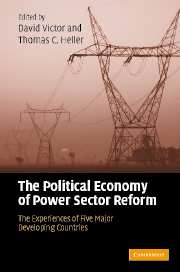Book contents
- Frontmatter
- Contents
- List of figures
- List of tables
- Notes on contributors
- Preface
- 1 Introduction and overview
- 2 Political economy of the Brazilian power industry reform
- 3 Reform of the Chinese electric power market: economics and institutions
- 4 The political economy of Indian power sector reforms
- 5 The Mexican Electricity Sector: economic, legal and political issues
- 6 The political economy of power sector reform in South Africa
- 7 Major conclusions: the political economy of power sector reform in five developing countries
- Bibliography
- Index
7 - Major conclusions: the political economy of power sector reform in five developing countries
Published online by Cambridge University Press: 22 September 2009
- Frontmatter
- Contents
- List of figures
- List of tables
- Notes on contributors
- Preface
- 1 Introduction and overview
- 2 Political economy of the Brazilian power industry reform
- 3 Reform of the Chinese electric power market: economics and institutions
- 4 The political economy of Indian power sector reforms
- 5 The Mexican Electricity Sector: economic, legal and political issues
- 6 The political economy of power sector reform in South Africa
- 7 Major conclusions: the political economy of power sector reform in five developing countries
- Bibliography
- Index
Summary
From 1990 to today many of the world's electric power systems have undergone dramatic institutional transformations. Where state-owned electric enterprises (SOEs) had historically prevailed, governments have sought to promote investment and better management by encouraging private enterprise and market competition. The studies in this book have examined that transformation in five key developing countries – Brazil, China, India, Mexico and South Africa. These countries are amongst the most sizeable and populous of the emerging economies. They offer a diversity of experiences with fuels, technologies, and institutions.
In all five of these countries, as in most of the world, electric power systems originated in the late nineteenth century as privately operated networks that supplied services to large industrial users, wealthy homes, and for some public purposes such as street lighting. Even in settings where the state owned and operated parts of these early power networks, the private sector dominated. Fears that private owners would monopolize their position were largely dormant – in part because these early private systems were often governed loosely as franchises and mainly because electricity was a boutique product that faced many competitors, such as the sun and town gas for lighting and water mills and steam engines for industrial torque.
From the 1930s through the 1950s the state assumed control over the power sector in all five of these countries. There were few outright nationalizations.
- Type
- Chapter
- Information
- The Political Economy of Power Sector ReformThe Experiences of Five Major Developing Countries, pp. 254 - 306Publisher: Cambridge University PressPrint publication year: 2007
- 3
- Cited by



